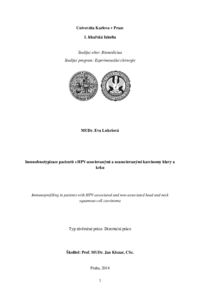Imunofenotypizace pacientů s HPV-asociovanými a neasociovanými karcinomy hlavy a krku
Immunoprofiling in patients with HPV-associated and non-associated head and neck squamous cell carcinoma
dissertation thesis (DEFENDED)

View/
Permanent link
http://hdl.handle.net/20.500.11956/66502Identifiers
Study Information System: 153683
Collections
- Kvalifikační práce [4588]
Author
Advisor
Referee
Šlapák, Ivo
Laco, Jan
Faculty / Institute
First Faculty of Medicine
Discipline
-
Department
Department of Otorhinolaryngology, Head and Neck Surgery First Faculty of Medicine
Date of defense
15. 12. 2014
Publisher
Univerzita Karlova, 1. lékařská fakultaLanguage
Czech
Grade
Pass
Keywords (Czech)
Karcinom hlavy a krku,orofarynx, HPV, imunitní stav, Treg, prognostické faktoryKeywords (English)
Head and neck squamous cell carcinoma, oropharynx, HPV, immune status, Treg, prognostic factorsKarcinomy hlavy a krku (HNSCC) jsou s přibližně 550 000 každoročně nově diagnostikovanými případy celosvětově významnou příčinou nemocnosti a úmrtnosti. Mezi hlavní etiologické faktory patří kouření a konzumace alkoholu. Přibližně 25% karcinomů hlavy a krku je asociováno s infekcí lidskými papillomaviry (HPV). Velké epidemiologické studie popisují v posledních 40 letech vzestupný trend v incidenci karcinomů orofaryngu, zatímco incidence karcinomů v jiných lokalitách horních cest dýchacích a polykacích má sestupnou tendenci. Tato vzrůstající incidence je vysvětlována HPV infekcí. Z klinického hlediska je nejvýznamnější, že pacienti s HPV-asociovanými karcinomy mají lepší prognózu a nižší frekvenci recidivy onemocnění. U pacientů s HNSCC byla detekovaná řada jak kvalitativních tak kvantitativních abnormalit buněk imunitního systému. Existuje jen několik málo prací, které porovnávají jak virologické, tak imunologické parametry a korelují je s prognózou pacienta. Dizertační práce byla zaměřená na studium imunologického profilu u pacientů s HNSCC, který je či není etiologicky spjat s HPV. Do souboru bylo zařazeno 110 pacientů s HNSCC. Na základě HPV 16 E6 mRNA izolované z nádorové tkáně byli pacienti rozděleni do skupiny HPV-pozitivních a HPV-negativních. Základní lymfocytární subpopulace v periferní...
Head and neck squamous cell carcinomas (HNSCC) remain a significant cause of morbidity worldwide, with approximately 550,000 new cases diagnosed each year. The main etiological factors include smoking and alcohol consumption. The incidence of non-oropharyngeal HNSCC is gradually decreasing while the incidence of squamous cell oropharyngeal carcinoma (OPSCC) is still on the rise. This increasing incidence can be most likely attributed to an increasing prevalence of human papillomavirus (HPV) infection. From the clinical point of view the most significant fact is that patients with HPV positive OPSCC have better prognosis. HNSCC is linked to an alteration in the immune system. Only a limited number of studies have correlated both the immunological parameters and HPV status with patient prognosis. Therefore, we focused on the research of the immunological profile of patients with HNSCC of viral and non-viral etiology. In our study, 110 patients with HNSCC were enrolled. They were divided into HPV-positive and HPV-negative groups based on the expression of HPV 16 E6 mRNA detected in the tumor tissue. Basic lymphocyte subpopulations (CD3+, CD4+ CD25+ Treg, CD4+ CD25+ FoxP3 Treg, CD4+, CD8+, CD19, and CD3- CD16+ CD56+ cells) were determined by flow cytometry in the peripheral blood (PB). We observed...
